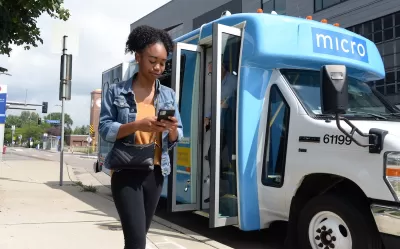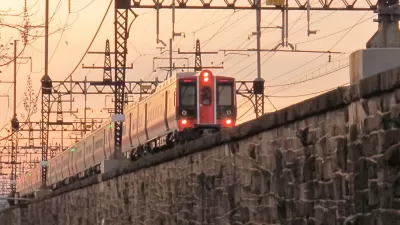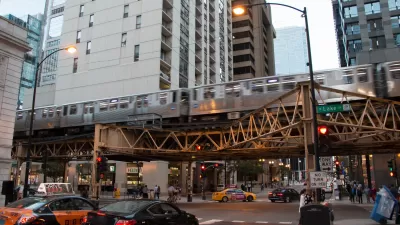In Minnesota, local transit agencies are seeing growth in ridership for on-demand microtransit services since the start of the pandemic.

The benefit of microtransit is tremendous to riders like Andrew Landon, a Minneapolis-St. Paul area resident who uses a wheelchair. Landon told Minnesota Reformer reporter H. Jiahong Pan that he prefers to use microtransit over dial-a-ride and fixed-route services because it allows him to “live more spontaneously.” Microtransit offers a middle ground between fixed-route transit services and rideshare apps like Uber and Lyft, shuttling riders to their destination on demand in low-density areas.
Landon is not alone in his preference for microtransit. While train and bus services have struggled to climb to their pre-pandemic ridership numbers, Minnesota Valley Transit Authority’s on-demand microtransit program, Connect, has seen an increase in ridership so high that it struggles to keep up with hiring drivers.
Services like Connect offer alternatives to calling a ride on an app, usually arrive as wheelchair-accessible minibuses, and cost as little as $2.50. Riders can pay with card, cash, or through the app. This flexibility allows for a more accessible service than fixed-route transit or rideshare.
Connect also offers more stable employment to drivers, who are W-2 employees and have the option to join a union. In contrast, most rideshare companies hire drivers as independent contractors. MVTA Chief Operating Officer Matt Fyten told Pan that “partnering with transportation network companies such as Lyft is something MVTA is looking into,” but they don’t intend to use Lyft as an excuse to not hire more drivers.
While agencies like MVTA are struggling to keep up with demand for microtransit, support for a one-year pilot program from the state legislature and the Minnesota Department of Transportation will give new riders a chance to try the service.
FULL STORY: Local transit agencies mimicking Uber and Lyft are seeing big ridership gains

Alabama: Trump Terminates Settlements for Black Communities Harmed By Raw Sewage
Trump deemed the landmark civil rights agreement “illegal DEI and environmental justice policy.”

Study: Maui’s Plan to Convert Vacation Rentals to Long-Term Housing Could Cause Nearly $1 Billion Economic Loss
The plan would reduce visitor accommodation by 25% resulting in 1,900 jobs lost.

Planetizen Federal Action Tracker
A weekly monitor of how Trump’s orders and actions are impacting planners and planning in America.

Wind Energy on the Rise Despite Federal Policy Reversal
The Trump administration is revoking federal support for renewable energy, but demand for new projects continues unabated.

Passengers Flock to Caltrain After Electrification
The new electric trains are running faster and more reliably, leading to strong ridership growth on the Bay Area rail system.

Texas Churches Rally Behind ‘Yes in God’s Back Yard’ Legislation
Religious leaders want the state to reduce zoning regulations to streamline leasing church-owned land to housing developers.
Urban Design for Planners 1: Software Tools
This six-course series explores essential urban design concepts using open source software and equips planners with the tools they need to participate fully in the urban design process.
Planning for Universal Design
Learn the tools for implementing Universal Design in planning regulations.
Caltrans
Smith Gee Studio
Institute for Housing and Urban Development Studies (IHS)
City of Grandview
Harvard GSD Executive Education
Toledo-Lucas County Plan Commissions
Salt Lake City
NYU Wagner Graduate School of Public Service





























